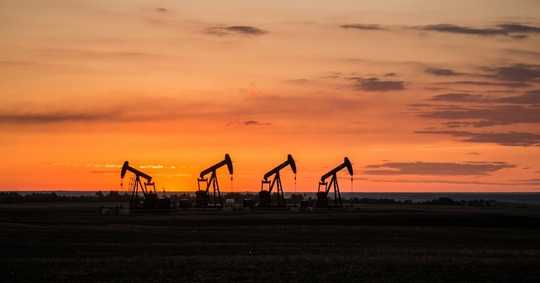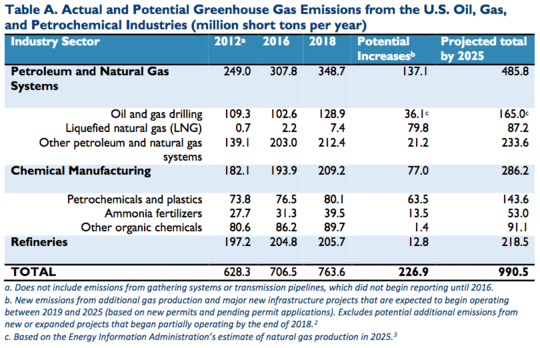
This analysis shows that we're heading in the wrong direction and really need to slow emissions growth from the oil, gas, and petrochemical industries.
A new analysis from the Environmental Integrity Project warns of the potential added greenhouse gas emissions from expansion of U.S. oil, gas, and petrochemical industries over the next five years. (Photo: Jeff Wallace/Flickr/cc)
Planet-heating pollution from the U.S. oil, gas, and petrochemical industries could rise about 30% by 2025 compared with 2018 because of additional drilling and 157 new or expanded projects "fueled by the fracking boom," an environmental watchdog group warned Wednesday.
That estimated emissions increase is equal to "as much greenhouse gas pollution as 50 new coal-fired power plants," the U.S.-based Environmental Integrity Project (EIP) explained in a statement announcing the new analysis.
The EIP report—titledGreenhouse Gases from Oil, Gas, and Petrochemical Production (pdf)—details recent and potential future emissions from U.S. petroleum and natural gas systems, chemical manufacturing, and oil refineries based on data reported to the Environmental Protection Agency, fossil fuel production projections from the Department of Energy, and permits that companies are seeking or have acquired.
"Facilities in these sectors reported emitting 764 million tons of greenhouse gases (carbon dioxide equivalent tons) in 2018, an eight percent increase since 2016," the report says. "Expected growth in oil and gas production and large new and expanded oil, gas, and chemical plants have the potential to add up to 227 million additional tons of greenhouse gases by 2025."
"That could bring total emissions to nearly one billion tons, equivalent to the greenhouse gas output from more than 218 large coal-fired power plants operating around the clock at full capacity," the report continues, noting that the estimates "likely understate emissions growth from the oil, gas, and petrochemical sectors."

Aided by both the Obama and Trump administrations, the expansion of the oil, gas, and petrochemical industries in the United States continues despite repeated and increasingly urgent warnings from experts that the U.S. fracking boom is threathening ecosystems and making people sick.
Scientists have called for all countries—but particularly the world's wealthiest—to rapidly phase out fossil fuels in favor of 100% renewable energy to prevent the worst impacts of the global climate emergency.
"The U.S. is already struggling to meet climate commitments and transition to a low-carbon future," Courtney Bernhardt, research director at the EIP, said in the group's statement. "This analysis shows that we're heading in the wrong direction and really need to slow emissions growth from the oil, gas, and petrochemical industries."
The report concludes that "the industries responsible for driving fossil fuel extraction and production need to be held more fully accountable for their actions and the consequences of those actions." Its key recommendations are to strengthen permits, improve monitoring and reporting, and increase funding to state environmental agencies.
"Oil and gas production and petrochemical manufacturing are responsible for most of the growth in greenhouse gas emissions today," EIP executive director Eric Schaeffer said Wednesday. "Unfortunately, the permits being issued by states and EPA for the largest projects do not include cost-effective methods for controlling greenhouse gas pollution, even though this is required by the federal Clean Air Act. Unless you think global warming is a hoax, that needs to change."
New Orleans-based Mark Schleifstein reported for The Times-Picayune Wednesday that EIP found the contentious $9.4 billion Formosa complex proposed for St. James Parish would have the highest potential yearly greenhouse gas emissions (13.6 million tons) among all the future and petrochemical and plastics projects included in the analysis.

As Common Dreams reported last month, Louisiana residents and environmental justice groups are fighting against construction of the plant in the region nationally known as "Cancer Alley" because of the area's significant industrial development and the related health impacts on local communities.
Louisiana Department of Environmental Quality spokesperson Greg Langley told The Guardian Tuesday that the state has issued 16 key air quality permits for the project that that essentially clears the way for Formosa to begin construction on the new facility.
In a statement responding to the development Tuesday, Sharon Lavigne, president of the campaign group Rise St. James, vowed to maintain local resistance to the project. "We are fighting to protect our homes and our families from this monster, Formosa," she said. "We are not going to stop because of this bad decision by the state to grant air permits."
About The Author
Jessica Corbett is a staff writer for Common Dreams. Follow her on Twitter: @corbett_jessica.
This article originally appeared on Common Dreams
Related Books
Climate Change: What Everyone Needs to Know
by Joseph Romm The essential primer on what will be the defining issue of our time, Climate Change: What Everyone Needs to Know® is a clear-eyed overview of the science, conflicts, and implications of our warming planet. From Joseph Romm, Chief Science Advisor for National Geographic's Years of Living Dangerously series and one of Rolling Stone's "100 people who are changing America," Climate Change offers user-friendly, scientifically rigorous answers to the most difficult (and commonly politicized) questions surrounding what climatologist Lonnie Thompson has deemed "a clear and present danger to civilization.". Available On Amazon
The essential primer on what will be the defining issue of our time, Climate Change: What Everyone Needs to Know® is a clear-eyed overview of the science, conflicts, and implications of our warming planet. From Joseph Romm, Chief Science Advisor for National Geographic's Years of Living Dangerously series and one of Rolling Stone's "100 people who are changing America," Climate Change offers user-friendly, scientifically rigorous answers to the most difficult (and commonly politicized) questions surrounding what climatologist Lonnie Thompson has deemed "a clear and present danger to civilization.". Available On Amazon
Climate Change: The Science of Global Warming and Our Energy Future second edition Edition
by Jason Smerdon This second edition of Climate Change is an accessible and comprehensive guide to the science behind global warming. Exquisitely illustrated, the text is geared toward students at a variety of levels. Edmond A. Mathez and Jason E. Smerdon provide a broad, informative introduction to the science that underlies our understanding of the climate system and the effects of human activity on the warming of our planet.Mathez and Smerdon describe the roles that the atmosphere and ocean play in our climate, introduce the concept of radiation balance, and explain climate changes that occurred in the past. They also detail the human activities that influence the climate, such as greenhouse gas and aerosol emissions and deforestation, as well as the effects of natural phenomena. Available On Amazon
This second edition of Climate Change is an accessible and comprehensive guide to the science behind global warming. Exquisitely illustrated, the text is geared toward students at a variety of levels. Edmond A. Mathez and Jason E. Smerdon provide a broad, informative introduction to the science that underlies our understanding of the climate system and the effects of human activity on the warming of our planet.Mathez and Smerdon describe the roles that the atmosphere and ocean play in our climate, introduce the concept of radiation balance, and explain climate changes that occurred in the past. They also detail the human activities that influence the climate, such as greenhouse gas and aerosol emissions and deforestation, as well as the effects of natural phenomena. Available On Amazon
The Science of Climate Change: A Hands-On Course
by Blair Lee, Alina Bachmann The Science of Climate Change: A Hands-On Course uses text and eighteen hands-on activities to explain and teach the science of global warming and climate change, how humans are responsible, and what can be done to slow or stop the rate of global warming and climate change. This book is a complete, comprehensive guide to an essential environmental topic. Subjects covered in this book include: how molecules transfer energy from the sun to warm the atmosphere, greenhouse gases, the greenhouse effect, global warming, the Industrial Revolution, the combustion reaction, feedback loops, the relationship between weather and climate, climate change, carbon sinks, extinction, carbon footprint, recycling, and alternative energy. Available On Amazon
The Science of Climate Change: A Hands-On Course uses text and eighteen hands-on activities to explain and teach the science of global warming and climate change, how humans are responsible, and what can be done to slow or stop the rate of global warming and climate change. This book is a complete, comprehensive guide to an essential environmental topic. Subjects covered in this book include: how molecules transfer energy from the sun to warm the atmosphere, greenhouse gases, the greenhouse effect, global warming, the Industrial Revolution, the combustion reaction, feedback loops, the relationship between weather and climate, climate change, carbon sinks, extinction, carbon footprint, recycling, and alternative energy. Available On Amazon
From The Publisher:
Purchases on Amazon go to defray the cost of bringing you InnerSelf.comelf.com, MightyNatural.com, and ClimateImpactNews.com at no cost and without advertisers that track your browsing habits. Even if you click on a link but don't buy these selected products, anything else you buy in that same visit on Amazon pays us a small commission. There is no additional cost to you, so please contribute to the effort. You can also use this link to use to Amazon at any time so you can help support our efforts.






























